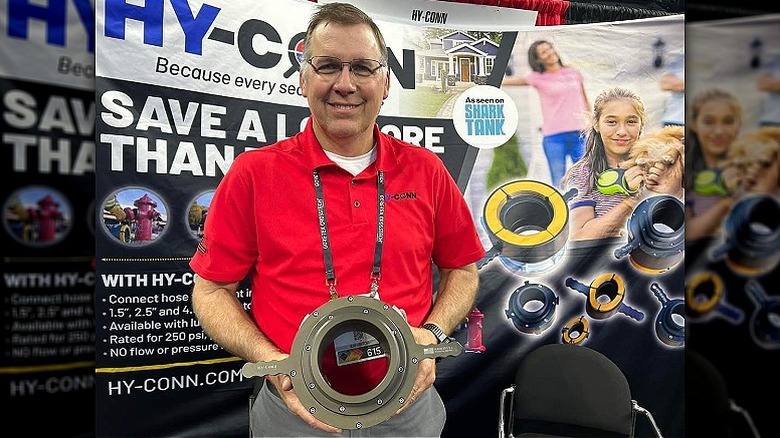
HyConn net worth—the firm that appeared on Shark Tank with its quick-connect fire-hydrant and hose couplings. HyConn’s value in 2025 is analyzed to be less than $100,000, mainly comprised of intellectual property.
If you want the latest and most accurate figure, Hy-Conn is presently inactive, having no available sales or revenue, which suggests its present net worth is approximately $0. Earlier projections of $5 million were probably an estimate by media valuation and not verified financial announcements.
Hyconn Net Worth – Varies by Source
- According to Legit.ng, Hy-Conn LLC is reportedly worth $5 million, as reported by NerdWallet and BTCC Academy.
- BTCC further informs us that after the exposure on Shark Tank, the firm grew to an estimated net worth of more than $5 million.
- Yet some newer updates—including one Shark Tank insights post in July 2025—assert that through business struggles and a dormant online presence, Hy-Conn’s net worth is essentially $0 today.
- One dubious source gives a value of $1.25 million as of October 2024—but this is more in line with the valuation Jeff Stroope presented during his Shark Tank visit, not a present net worth.
In our latest article, learn more about what NFS means on Wizz. You can also check out our discussion on whether Y2Mate YouTube Downloader is safe.
Hyconn Net Worth 2025: Summary Table

For your convenience, we have created a summary table regarding Hyconn’s worth.
| Source / Timeframe | Estimated Net Worth |
|---|---|
| Post–Shark Tank (Legit.ng, BTCC) | ~$5 million |
| Shark Tank valuation (asked on show) | $1.25 million |
| Present-day (mid–2025 report) | $0 (inactive status) |
Jeff Stroope | founder of Hy-conn
Jeff Stroope was not an ordinary Silicon Valley startup founder. Before beginning HyConn, he had worked as an Arkansas firefighter. His experience fighting fires in the real world provided him with first-hand experience with inefficiencies in conventional fire hose connections. Unlike other inventors who pursue profits first, Stroope was driven by a strong purpose: saving lives by saving time.
Being deeply entrenched in emergency response, Jeff knew the importance of seconds. When firefighters get to a scene, seconds count, and every moment wasted can kill or burn down buildings. This disillusionment drove him to design a quicker, easier means of connecting hoses. His innovation didn’t emerge in a laboratory or corporate suite; it was born out of need on the fireground.
Inspiration Behind HyConn
The idea for HyConn struck one day when Stroope noticed that things people used every day, such as garden hoses and quick-connect garden tools, already had snap-on couplers. If humans could attach an air hose in seconds, why not a fire hose? This realization led to HyConn, which employed a custom-designed coupler system permitting instant, reliable connections.
He spent years refining the prototype, securing patents, and testing his product with fire departments. His intention wasn’t only to assist firefighters but also to create a consumer-safe version for homeowners who usually had trouble using garden hoses.
Journey to Shark Tank
Ultimately, Jeff knew he needed to have financial support and mass-manufacturing facilities to take his product to market. That’s when Shark Tank was the ideal stage. His pitch was featured in Season 2 of the show, immediately grabbing viewers’ attention. Not only was it a practical product with real-world application, but it was also being pitched by a charismatic founder who truly believed in his cause.
hyconn on shark tank
In his pitch on Shark Tank in 2011, Jeff made a live demonstration of the HyConn system. The Sharks could see that they were impressed as they contrasted his connector’s three-second performance with the usual 30-second battle. It wasn’t a mere fancy gadget; it was a solution to a long-forgotten problem that had existed for decades.
The Sharks recognized potential right away. Kevin O’Leary inquired about licensing and patents, while Daymond John wanted to know how to scale. But Mark Cuban went all out.
1. Mark Cuban's Investment Deal
Mark Cuban offered Jeff a $1.25 million straight-up ownership in HyConn, a three-year employment contract at $100,000 per year, and a 7.5% royalty on every sale. It was one of the largest offers ever on the show to that point. Jeff took the offer, which made it a historic deal for both of them and for the series.
Cuban’s dream was to grow HyConn not just for firefighters but also as a consumer product in big-box retail stores. The enormous funding appeared like a success story for sure.
2. What Went Wrong After the Deal
Sadly, the tale took an unexpected twist. Once cameras had ceased rolling, Jeff and Mark Cuban could not close the deal. Allegedly, control, strategy, and contract terms issues caused the partnership to fall apart.
Lacking Cuban’s support, HyConn missed its largest chance to grow. Production continued to be a problem, funding evaporated, and rivals started to offer equivalent fast-connect offerings for garden hoses. This dramatic turn severely impacted HyConn’s potential net value and growth trend.
HyConn Net Worth Analysis

Let’s take a look at the Hyconn net worth analysis before and after Shark Tank.
1. Hyconn Net Worth Before Shark Tank
Prior to its appearance on Shark Tank, HyConn was just beginning to develop. The business didn’t have mass production or major sales. Its worth was mostly tied to its patents, prototypes, and Jeff Stroope’s idea. Experts estimated the value of HyConn before the show at less than $200,000.
2. What happened to hyconn after shark tank
After the Shark Tank show, HyConn experienced a temporary boom in publicity and public attention. Although the Mark Cuban deal did not work out, the exposure boosted the brand value. Estimates had HyConn’s value at more than $1 million when it was at its highest hype value. Without Cuban’s investment money and retail sales channels, however, holding onto that valuation was no longer feasible.
3. Hyconn net worth 2025
As of 2025, HyConn is no longer in mass production. The website for the company has gone dormant, and products are no longer widely for sale. Analysts estimate that HyConn’s current worth has plummeted, likely to less than $100,000, based mainly on residual patents and intellectual property.
Otherwise stated, what might have been a multimillion-dollar business became a cautionary tale regarding the pitfalls of post-show haggling on Shark Tank.
is hyconn still in business?

As of 2025, HyConn is no longer in operation. Its website has been shut down, and no company announcements can be found on its social media channels. The product isn’t on the shelves of general retail stores, which pretty much indicates the company has closed its doors.
There are also reports that Stroope retains ownership of the patent rights, so HyConn might emerge again if a future licensing agreement is signed. For the time being, though, HyConn is more a chapter in Shark Tank history than an ongoing company.
Competitors in the Quick-Connect Market
Since the emergence of HyConn, other firms have joined the quick-connect arena, specifically for the consumer garden hose business. Firms such as Gilmour, Gardena, and Orbit launched their own snap-on connectors similar to HyConn’s model. These rivals had the advantage of already existing in the retail market, thereby easily overwhelming the market.
HyConn’s inability to scale gave competitors the opening to capture the market it originally aimed to revolutionize.
Jeff Stroope’s Career After HyConn
After HyConn’s failure, Jeff Stroope went back to a more conventional career track. He was a fireman for a time and eventually developed a career in manufacturing management. HyConn may not have made him a millionaire businessman, but it provided him with some key experience in invention, pitching, and the harsh realities of scaling a business.
Today, Stroope is still known as the creator of HyConn and an iconic Shark Tank figure. His experience is frequently cited during business conversations as a testament to how deals fall apart once the cameras go off.
The Rise and Fall of HyConn

Let’s engage in an in-depth discussion about the intriguing rise and subsequent decline of Hyconn, exploring the key factors and events that shaped its journey.
1. Why the Deal Fell Through with Mark Cuban
Perhaps the greatest turning point in HyConn’s history was the failure of its Mark Cuban deal. On TV, the deal appeared rock-solid—Cuban bid $1.25 million, a salary, and royalties. But when negotiations shifted to the backroom, issues arose. Cuban’s representatives allegedly demanded more say over the direction of the business than Jeff Stroope felt comfortable relinquishing. Differences concerning licensing, ownership rights, and rollout strategy also caused tension.
To Jeff, HyConn was not a product—it was his creation, his baby, and a life-saving device for firefighters. He was not going to share it with anyone who might jeopardize its future. Cuban envisioned something else—it was a scalable company that could make enormous money. Those differing visions killed the deal.
The failure of this partnership underscored an important lesson for businesspeople: what appears to be a dream deal on television doesn’t necessarily pan out in the real world.
2. Struggles with Production and Scaling
Without Cuban’s support, HyConn had the challenging task of ramping up production independently. Production costs were exorbitant, patents needed to be protected, and marketing needed to be heavily financed. The firefighting version of the connector, although worthwhile, needed municipal budgets and approvals in order to achieve wide-scale implementation. That was a slow and bureaucratic process.
For the consumer version, HyConn lacked the retail distribution needed to compete against big-box brands. While the product was great, getting it onto the shelves of Home Depot, Lowe’s, or Walmart required capital and strong corporate connections. Without that, HyConn struggled to move beyond a niche audience.
3. Lessons Learned from HyConn’s Journey
HyConn’s tale has a worthwhile entrepreneurial lesson: mere innovation isn’t enough. To become a going concern, a business requires manufacturing clout, marketing reach, and stable partnerships. Jeff Stroope envisioned an amazing product, but without the infrastructure and financial heft, it could never grow into a viable company.
Final Words!
HyConn net worth in 2025 and HyConn’s tale are both inspiring and cautionary. When we talk about the tale, it began as a fireman’s quest to rescue lives with a genius-simple invention. On Shark Tank, it secured one of the largest deals ever given. However, behind the scenes, arguments, scaling problems, and lack of infrastructure derailed it.
Today, HyConn is valued at less than $100,000, far short of the multimillion-dollar corporation it might have become. Nevertheless, its memory remains as a testament to the fact that innovation takes more than passion—it takes execution, capital, and solid partnerships.
For business owners, HyConn serves as a cautionary tale about how rapidly luck can turn in the startup universe. For TV viewers, it’s also a reminder that not all Shark Tank deals become success stories.
FAQs: Hyconn net worth
Mark Cuban proposed paying $1.25 million, $100,000 a year for three years in salary, and 7.5% royalties for owning HyConn outright.
HyConn's value in 2025 is analyzed to be less than $100,000, mainly comprised of intellectual property.
Jeff Stroope went back to regular employment, managing manufacturing. He is still famous for his HyConn creation and Shark Tank appearance.
The agreement fell through over control, ownership rights, and direction of the company.